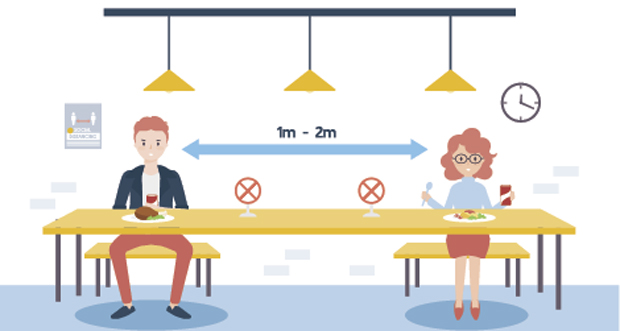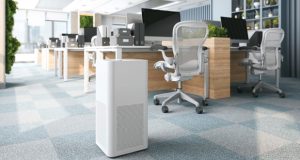 THE FM / CATERING CONSULTANT’S VIEW
THE FM / CATERING CONSULTANT’S VIEW
JULIAN FRIS,
DIRECTOR, NELLER DAVIES
Food is essential to life, but also to socialisation, productivity, motivation, wellbeing, connectivity – the list is endless. The real ROI in the future is around staff – without them you will not have a business.
Right now, clients really have to think about how they want to look after staff catering needs. In particular, social distancing measures will require a rethink in service delivery, but it is crucial to ensure that businesses are still offering a level of service to maintain sustainable employee engagement, as well as minimise risk.
Removing foodservice altogether would be disastrous, especially when the high street only remains partially open, and with much of the same challenges and creating an increased risk to staff. This could also be compounded by staff bringing their own food into the workplace and the infection control risk of shared fridges and kitchenettes.
We also have to consider that if more than half of the workforce are working from home, how are we going to keep them in the loop and equally as motivated? This is where an organisation’s Employer Value Proposition or EVP is so important. An EVP represents the values and culture the employer embodies and the practical benefits for employees such as learning, growth, development opportunities and benefits.
People are five times more likely to be highly engaged if their organisation has an effective EVP, according to Willis Towers Watson. For catering, this means that the employer needs to consider higher subsidies to support their staff with the benefit of potentially higher motivation, productivity and resulting in better outcomes for all. We have even seen some discussion around home deliveries being offered to staff so that they receive the same benefits when working from home.
Nevertheless, in practical terms, the social distancing measures will determine the amount of people who can actually be accommodated and be assigned a dedicated desk. They would have to be essential or key workers within the organisation e.g. facilities manager, H&S officer etc. Any staff wishing to come into the office will need to book ahead and state their reasons for being there.
Managing transmission risk is going to be crucial. Employers are effectively managing this now with a sensible mix of on-line and face-to-face working. There will naturally be costs associated with this change in facilities and services. If managed sensibly and thought-through, cost impacts could be outweighed by implementing more technology and trusting more remote working. The ROI will be great and a long-term view should be taken. Investment needs to happen now.
Service providers need to go beyond the installation of queuing, ‘sneeze screens’, anti-bac dispensers and contactless payment. Assisting the client in developing an EVP, investing in digitisation, re-engineering the model and adopting a more Vested/collaborative approach is where businesses will find that competitive edge.
 HOSPITALITY RECRUITMENT EXPERT’S VIEW
HOSPITALITY RECRUITMENT EXPERT’S VIEW
SAM BALDWINSON,
AREA MANAGER, REED HOSPITALITY AND LEISURE
In the last few months catering businesses and their staff have been looking to find ways to exist under lockdown. While many in the hospitality sector have been able to find innovative ways of continuing to deliver, while remaining compliant with lockdown rules the closing of offices has held some caterers back. However, now that lockdown has loosened, catering businesses can get started again, but in order for it to work, this will require efforts from employers, employees and clients.
During lockdown one of the hardest hit sectors has been hospitality. With bars and restaurants singled out as the last to reopen, hospitality businesses are extremely vulnerable to falling in financial distress or going out of business. In fact, research from Real Business Rescue found that 29 per cent of four-year-old food and beverage businesses fell into financial distress. This is why it is imperative that businesses in catering innovate with methods such as home deliveries – even from high-end restaurants – and setting up stalls outside bars and restaurants to sell produce. However, this tactic has been impossible for caterers providing services to FM clients. That is until the easing of lockdown in the past few weeks.
The changes to lockdown have acted as a starting gun for caterers supplying to FM clients. Getting back into business for these companies is not just about bringing in revenue and reconnecting with clients. In a business such as catering that relies so heavily on the power of its people, it has to create a safe environment for employees too in order to attract the best back in.
For a start, hygiene kits for employees are now essential. Anti-bacterial wipes, hand sanitiser gels and face masks to be worn throughout shifts, should be supplied. Reminders to wash hands properly and to socially distance will also be part of the package for safe reintroduction of catering teams. Government guidance also says that additional personal protective equipment should be worn if in a food processing environment. Allowing for additional time to maintain cleanliness and COVID-secure environments in schedules, will also become normal. In this instance employers may even choose to account for additional round-the-clock cleaners to help.
But hygiene is not the only aspect needed. A vital part of keeping employees and clients safe and happy will be adhering to social distancing. This will have to be applied from the creation of food to delivery. Some companies have already created socially distanced catering packages. These reduce the amount of shared platters on offer by offering individual selections, removing the traditional queue and close contact for food.
Learnings from other areas of hospitality can also be used. Companies should start to deliver to the entrance of facilities and verify that the delivery has been made from a distance. This could be the time that, if it hasn’t already been put into place, digital verification is brought in by catering companies.
Following the guidelines outlined on the government’s website and observing what other companies have already done is not just a matter of compliance. It is also a chance to impress and reassure clients and employees. Now that lockdown has eased caterers are eager to get back to work, but by doing this correctly there is two-fold benefit. Caterers have an opportunity to not just recover sustainably, but they can please clients and employees in the process by distinguishing the business as ‘safe and secure’ during this time of crisis to help attract new business and new employees.





